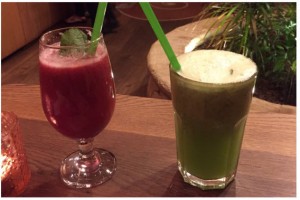Go Vegan!
Nov 24, 2015
7424 Views
The recent surge in fitness and health awareness has made exercise an integral part of our daily lives. But rigorous workouts aren’t for everyone and some of us genuinely live to eat. ‘Foodie’ isn’t just a fun term today; it also defines a person with an exceptional palette. Many people love to experiment, try new joints – be daring with their taste buds. So how does one strike the right balance with healthy yet good food, not put on weight, but still be able to enjoy?

A cute little Vegan restaurant called Maitrea (in Prague); did the trick for me. Vegetarian food with lots of salad, a menu filled with variety helped satisfy the thrill for adventure and inspired to read a bit more about this cuisine. A few interesting facts for all the food lovers out there:
- Several studies show that a plant-based diet increases the body’s metabolism, causing the body to burn calories up to 16% faster than the body would on a meat-based diet for at least the first 3 hours after meals.
- The American Dietetic Association (ADA) concludes that a vegetarian or vegan diet is healthier than one that includes meat. They noted that vegetarians have lower body mass indices, lower rates of death from ischemic heart disease, lower blood cholesterol levels, lower blood pressure, lower rates of hypertension, and type 2 diabetes.
- Vegans get their protein from products like lentils, black beans, veggie burgers, tofu, nuts, peanut butter, and soy milk. As vegans do not consume dairy products like milk and cheese, they intake calcium with foods like broccoli, bok choy, Chinese cabbage, collards, kale, and calcium-fortified orange juice.
- A study done by Nobel Prize winner Elizabeth Blackburn found that a vegan diet caused more than 500 genes to change in three months, turning on genes that prevent disease and turning off genes that cause cancer, heart disease, and other illnesses.
- Most cases of food poisoning (up to 80%), are due to infected meat. Although people are consuming too many antibiotics for their own health, animals receive even more. Livestock are fed up to 17.8 million pounds of antibiotics a year (U.S. Stats), and this number could actually be less than what is really being given to them.
- With rising populations and growing demand for meat in the developing world, several scientists are currently working on more environmentally friendly ways to produce meat in labs. However, when asked if people would purchase a meat alternative grown from animal cell DNA obtained years ago (which does not currently involve raising animals), the response was overwhelmingly negative. Only 2% of the vegans surveyed said yes and only 11% of all the groups surveyed (including meat eaters) expressed interest in such products.
- Research recently published in the Nutrition Journal, stated that non-meat eaters are happier and less stressed than those that eat meat. Fatty acids are being confirmed as the main source. Diets that include meat and fish are higher in arachidonic acid (AA), an animal source of omega-6 fatty acids. Previous studies have shown high levels of AA can cause mood swings.
- Studies have also shown that a vegan diet leads to an increase in libido. Vegans tend to intake more zinc and vitamin B complexes than meat eaters and therefore have an increased sex drive. Also, a vegan diet changes our body’s overall chemistry, which can make the body and bodily secretions taste and smell sweeter. Plus, fructose, a natural sugar found in fruit increases energy and stamina. High water volume in fruits and vegetables also increase overall hydration.
- ‘A well-balanced vegan diet is typically higher in vitamin C’, says Kirkpatrick. ‘Vitamin C is needed for collagen metabolism, which increases the elasticity of the skin, providing a smoother and less-wrinkled complexion.’ We can get our highest dose in foods like papaya, strawberries, oranges, kale, lemon, cauliflower and garlic. Researchers recommended we limit the total leucine – an amino acid found in meat, intake mostly found in animal protein to decrease acne on our skin.
- Dr. Ornish, a cardiologist, fed 31 men with low-grade prostate cancer a plant-based diet with fewer than 10% of calories from fat. At the end of only three months, 48 genes crucial to cancer growth were found to be more active but 453 genes (ones that controlled for tumor growth and protein production) were less active in producing proteins. Overall, blood tests for prostate activity improved and tumors shrunk.

These facts help point out the health and genetic benefits of following this diet. It helps save the slaughter of animals, find a temporary solution to world hunger and saves water as well (amount used in meat processing factories). It has far too many advantages, to not be tried for a while, maybe just once a week to take a break from the strict exercise regime. It’s not a permanent diet, not made compulsory by religion or family – it’s a lifestyle choice that one can make from being genetically aware or for the pure love of adventure and good food.
Planning to switch to a new diet?
Before making a lifestyle choice, try MyFitGene – your DNA based diet and fitness planner. While the genetic test tells you more about your lifestyle choices, a genetic counselor will correlate your report with health history, and our nutrition counselor will review your diet and give you action plans to make the switch easier.
